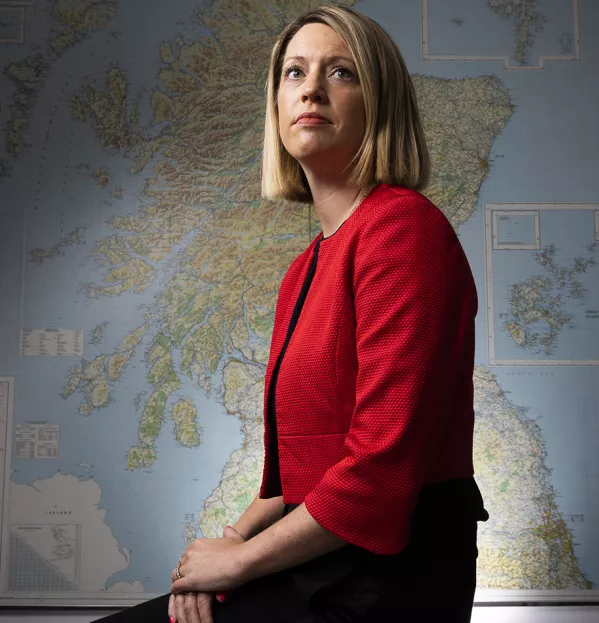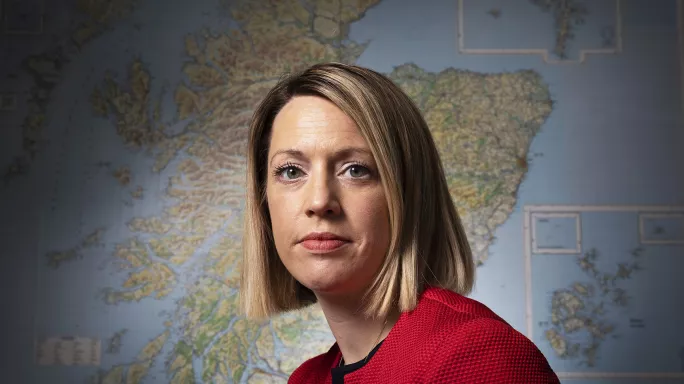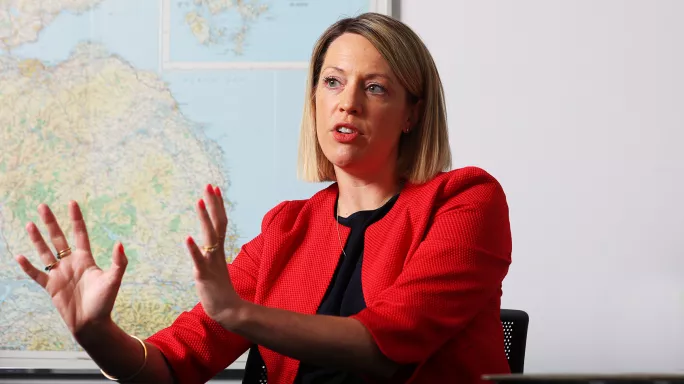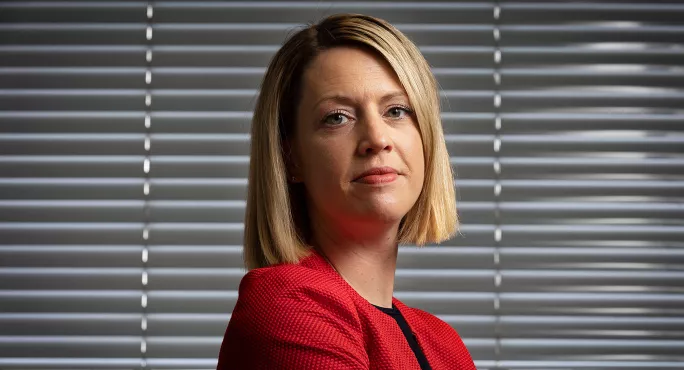Jenny Gilruth: ‘I want to mend our relationship with the profession’

The best thing about being a teacher was the children and the worst thing was the paperwork, says Jenny Gilruth - Scotland’s new education secretary and a former secondary teacher.
“I miss that buzz of teaching,” she says, in her first sit-down interview since being appointed at the end of March.
“What do I not miss? I was a principal teacher when I stood for election, and as a principal teacher, I had to do a lot of paperwork. I don’t miss that.
“But the day-to-day classroom teaching is the best part of the job - I think any teacher would say that.”
Gilruth, who stopped teaching when she was elected to the Scottish Parliament in 2016, became education secretary in Humza Yousaf’s cabinet reshuffle earlier this year - after he became Scotland’s first minister and just before his party, the SNP, was plunged into crisis over its finances.
The investigation into the alleged mishandling of more than £600,000 in donations - which led to former first minister Nicola Sturgeon being arrested and then released without charge on 11 June - is ongoing.
And while Yousaf has not been implicated and has tried to put the spotlight back onto his own government - his latest paper on Scotland’s potential future as an independent country was published just over a week ago on 27 July - the scandal over the party’s finances has cast a long shadow over the early months of his leadership.
Gilruth, meanwhile, has faced tough questions - and calls from the Tories to resign - relating to her time as minister for transport.

Asked what the first four months in her new role have been like, Gilruth says: “It’s been an interesting period to become education secretary given where my party is, and I don’t think anyone can deny that has had an impact on the government at large.”
One consequence, Gilruth feels, is that the big changes being mooted to, for example, the exam system have not penetrated the public consciousness in the way they might have done in less eventful times.
“Some key moments haven’t had the focus they might have had in a different time, because the focus has been on the politics of where we are just now,” she says.
When education has hit the headlines, it has often been for all the wrong reasons - because of concerns about pupil behaviour or mixed messages over big SNP pledges such as free meals for all primary pupils (rather than just P1-5, as is the case just now). In May, it looked like Yousaf was preparing to halt the rollout of free lunches to P6-7s after he said he favoured targeting support at “those that need it absolutely the most” - leaving his deputy, Shona Robison, to clarify that the rollout would indeed go ahead.
Still, despite this flip-flopping and the big question marks over the delivery of other key education policies such as the promised increase in teacher numbers and non-class contact time, there is some hope that a former teacher in the driving seat might be cause for optimism. That is something Gilruth is more than aware of.
“I feel a great expectation from the profession that I’m a teacher, so I can sort everything out,” she says. “And the way I feel is that I’m a teacher, so I know how challenging it is.”

One of Gilruth’s immediate priorities, she says, is “to mend” the relationship between the government and the profession in the wake of the teacher strikes over pay that started in November last year, with a settlement finally reached in March.
“I know it was a really difficult decision for the profession to take industrial action - but particularly for such a prolonged period of time. So it’s been a really rocky experience,” she explains.
Andrea Bradley, the general secretary of Scotland’s largest teaching union, the EIS, agrees that relationships need repairing. She says the reputation of the Scottish government and the councils umbrella body, Cosla, was “quite seriously damaged” by experiences during the pay campaign - during which teachers felt “they were habitually being gaslighted” by the government’s negotiating tactics. That has damaged trust, she says.
How will Gilruth repair the damage? “By listening, by going out and speaking to the profession,” she says. “It’s been a large factor in my decision to pause the reform process because I don’t feel the profession has been as fully engaged as it might have been otherwise. And certainly, in my experience of speaking to the profession, [teachers] don’t feel that they’ve been engaged with to the extent that they should have been by this time. So I think it’s really important that we are on the ground and we’re listening.”
Just before the summer holidays, Gilruth announced that she was pausing education reform. The Scottish government has committed to replacing the Scottish Qualifications Authority (SQA) exams body, as well as splitting the Education Scotland quango - responsible for both inspection and curriculum development and support since its formation in 2011 - into an independent schools inspectorate and a new national education agency.
It also committed back in 2021 to reforming secondary school qualifications, appointing assessment expert Professor Louise Hayward to explore a potential future assessment model.
But when Hayward’s final report was published in June - in the wake of three other “substantive reports” - Gilruth said she was “determined to take the time needed” to ensure that any reform was “bold” and “holistic”. On qualifications reform in particular, she said that before she arrived at any conclusions, she needed “to hear from our teachers, particularly our secondary teachers, who will be key in driving any changes to our qualifications system”.
Now, at Gilruth’s behest, time will be set aside during the in-service days that take place ahead of pupils returning in August to focus on education reform - specifically, the outcomes of the national discussion on Scottish education (a major report based on the views of 38,000 people) and the Hayward review.

But what is Gilruth’s own view on some of the - as she puts it - “radical” ideas put forward by Hayward, including the recommendation that “the current system has too many examination points” and that there should be “no external examinations at SCQF levels 1-5” (the levels below the Higher, which the government has in the past referred to as the “gold standard” of Scottish school-level assessment)?
Gilruth says she likes the idea of more continuous assessment and using a broader range of assessments, but is “in two minds” about the prospect of effectively scrapping external exams in S4.
“Some of my former colleagues would say National 4 not having a final examination has devalued the qualification,” she says, speaking just days before the annual SQA results day hoopla (taking place tomorrow, 8 August), which will again put the focus on qualifications that culminate in external exams (such as National 5, to which National 4 is often compared unfavourably).
“If I want to unpick the qualifications system, then I need the buy-in of the profession. And I don’t feel that the profession, at the current time, has been engaged fully enough in the development of what that looks like,” she continues.
“I read Professor Hayward’s report and I think there are some really exciting ideas in it, and then I think about how I would timetable it in school - and these are the practical questions that teachers will be thinking about. So that’s why they have to be part of what comes next.”

That insight into the practicalities of how policy plays out on the ground in schools is a product of Gilruth’s time working in education.
After loving school herself - her secondary education took place at state school Madras College in St Andrews - Gilruth’s career in teaching got underway in 2008 and ended in 2016 when she was elected as MSP for Mid Fife and Glenrothes.
In Scotland, all newly qualified teachers - in order to become fully qualified - are entitled to a year’s employment in a school so they can complete their probation. Gilruth “ticked the box”, meaning she agreed to be placed in any school in Scotland in exchange for a payment, currently set at £6,000 for primary teachers and £8,000 for secondary teachers.
She ended up at Elgin High in Moray teaching modern studies, a subject unique to Scotland with a focus on politics and current affairs.
But when she finished her probation, she found that “it was a very competitive jobs market” and the post available in Elgin was not full-time.
“Nobody can afford to live on a 0.6 contract, so I made the decision to keep applying for other jobs,” she says.
Gilruth - who got married last year to former Scottish Labour leader Kezia Dugdale - landed a full-time job at the Royal High School in Edinburgh, where she stayed until she was elected.
However, the low proportion of post-probationers securing similar full-time permanent posts has recently attracted huge criticism.
Last year, just 20 per cent of new primary teachers, who completed their induction in 2021-22, had a permanent part-time or full-time job by the September after they became fully qualified.
At secondary, the figures are better - 50 per cent of secondary post probationers who carried out their induction in 2021-22 had a permanent job by the September after they became fully qualified.
However, North Lanarkshire Council triggered a storm of protest in late June when it told 80 primary teachers and 50 secondary teachers via email, just days before the summer holidays, that they would not be offered temporary or fixed-term contracts from August.
Bradley, the EIS union general secretary, brands current recruitment practices as “cruel”; she says that teachers are “unable to plan their lives” and that they have been left feeling “disposable” and “expendable”.
How do such criticisms make Gilruth feel?
“Pretty uncomfortable,” she admits.
She goes on to trot out the usual line about councils - not the Scottish government - being the employers of teachers, and highlights the £145.5 million of funding that went to maintain increased teacher numbers. But she also says that, while new teachers cannot expect to “walk into the primary school at the end of [their] road”, it might be time to “guarantee a certain number of years’ employment”.
“These are all things I want to unpack,” she says, adding: “Bluntly, if I’m funding people to undertake their undergraduate qualification and postgraduate qualification and the first year of teaching, I don’t want them to leave the profession. We want to retain talent in the teaching profession. So I need to work with Cosla on how we can better support that, because it is a challenge.”

In May, Gilruth announced she would convene a summit focused on tackling violence in schools. During her time in teaching, she says, she witnessed “very different approaches to behaviour management”, with a move towards positive behaviour management and “having restorative conversations with children and young people”.
“I think that really helps take the heat out of situations,” she says.
Previously, she goes on, children would have been shouted at or taken outside of classrooms to be disciplined - and where we are now is “night and day”.
It’s a shift she welcomes. When she was at Elgin High, there was a room called “the cooler” where children were sent if they had been misbehaving in class. It was next door to her classroom and she remembers trying to deliver lessons when pupils were in there “having a carry-on”. Their educational needs were not being met, she says, and that room no longer exists - and that, she believes, is a positive change.
However, she adds, there is more to addressing the problem of behaviour than simply asking teachers to use more restorative approaches.
“I don’t think you can say restorative practices can solve everything because they can’t. [Those approaches] need partnerships around them. It’s not just the role of the classroom teacher to deliver behaviour management. If you don’t have that wider back-up in the school community, that kind of culture, that ethos, can’t be supported.”
Behaviour management, she continues, “is always about your relationships”.
“If you don’t know your kids, you can’t possibly hope to have any level of control for that class,” she adds.

Gilruth wants to use the summit to understand what is actually happening in schools; she says that sometimes incidents are “sensationalised” and then used “in the media as examples of wider trends”.
This, she believes, “can sometimes be quite dangerous”.
At the same time, though, she recognises that “mental health is undoubtedly a problem” - as is “regulating behaviour” after school routines were broken during the pandemic.
There is a sense at council level that Gilruth was spurred to action on behaviour by a media frenzy that the Tories capitalised on - it was, after all, during a Scottish Conservatives debate on ending violence in schools that Gilruth announced her own summit. There is also scepticism about whether the focus on behaviour will have any impact, other than to suck up valuable time and energy. Where, critics ask, will the resources come from to do anything about it?
Bradley, for one, has welcomed the summit - but she questions whether it will be “just another talking shop rather than a real concerted effort to marshal the resources really needed in schools”.
And while she believes she and Gilruth are “able to speak a common language around some of the issues impacting education at the moment”, Bradley stresses that the EIS’s frustration has been around “the lack of funding put forward by the Scottish government for education, given the size of the ambition”.
There are those who think that if Gilruth is to be successful, she must “extract Gilruth the teacher from Gilruth the education secretary”, so she can focus on the big picture and set out her vision for Scottish education - and then fight for the funding to make it happen.
By pausing the reform, Gilruth has bought herself valuable time to do this. But the goodwill extended to her as a former teacher will not last long. Regardless of how keenly she understands the problems, ultimately the key question is whether she will be able to solve them.
You need a Tes subscription to read this article
Subscribe now to read this article and get other subscriber-only content:
- Unlimited access to all Tes magazine content
- Exclusive subscriber-only stories
- Award-winning email newsletters
Already a subscriber? Log in
You need a subscription to read this article
Subscribe now to read this article and get other subscriber-only content, including:
- Unlimited access to all Tes magazine content
- Exclusive subscriber-only stories
- Award-winning email newsletters
topics in this article



